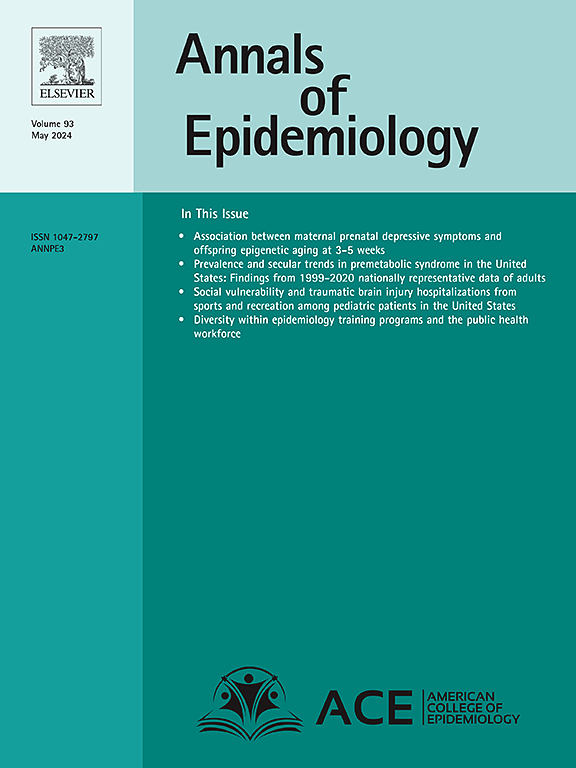The association between cumulative exposure to neighborhood walkability (NW) and diabetes risk, a prospective cohort study
IF 3.3
3区 医学
Q1 PUBLIC, ENVIRONMENTAL & OCCUPATIONAL HEALTH
引用次数: 0
Abstract
Purpose
To examine the association between cumulative exposure to neighborhood walkability (NW) and diabetes risk.
Methods
A total of 11,037 women free of diabetes at enrollment were included. We constructed a 4-item NW index at baseline, and a 2-item average annual NW across years of follow-up that captured both changes in neighborhood features and residential moves. We used multivariable Cox PH regression models with robust variance to estimate the hazard ratios (HRs) of diabetes by NW scores.
Results
Compared with women living in areas with lowest NW (Q1), those living in areas with highest NW (Q4) had 33 % (26 %−39 %) reduced risk of incident diabetes, using baseline NW, and 25 % (95 % CI 11 %−36 %), using average annual NW. Analysis using time-varying exposure showed that diabetes risks decreased by 13 % (10 %−16 %) per -standard deviation increase in NW. The associations remained similar when using inverse probability of attrition weights and/or competing risk models to account for the effect of censoring due to death or non-response. The associations of average annual NW with incident diabetes were stronger in postmenopausal women as compared to premenopausal women.
Conclusion
Long-term residence in more walkable neighborhoods may be protective against diabetes in women, especially postmenopausal women.
社区步行能力(NW)累积暴露与糖尿病风险之间的关系,一项前瞻性队列研究。
目的:研究社区步行能力(NW)的累积暴露与糖尿病风险之间的关系:共纳入了 11,037 名在注册时未患糖尿病的女性。我们在基线时构建了一个 4 个项目的步行指数,并在随访期间构建了一个 2 个项目的年平均步行指数,该指数同时反映了邻里特征的变化和住宅搬迁情况。我们使用具有稳健方差的多变量 Cox PH 回归模型来估算 NW 分数的糖尿病危险比(HRs):与居住在净值最低地区(Q1)的妇女相比,居住在净值最高地区(Q4)的妇女发生糖尿病的风险降低了 33% (26 %-39 %)(使用基线净值),而使用年平均净值则降低了 25% (95 % CI 11 %-36 %)。利用时变暴露进行的分析表明,NW 每增加一个标准差,糖尿病风险就会降低 13%(10%-16%)。当使用反概率自然减员权重和/或竞争风险模型来考虑因死亡或未回复而造成的删减影响时,相关性仍然相似。与绝经前妇女相比,绝经后妇女的年平均净周长与糖尿病发病率的关联性更强:结论:长期居住在步行能力较强的社区可能对女性,尤其是绝经后女性的糖尿病有保护作用。
本文章由计算机程序翻译,如有差异,请以英文原文为准。
求助全文
约1分钟内获得全文
求助全文
来源期刊

Annals of Epidemiology
医学-公共卫生、环境卫生与职业卫生
CiteScore
7.40
自引率
1.80%
发文量
207
审稿时长
59 days
期刊介绍:
The journal emphasizes the application of epidemiologic methods to issues that affect the distribution and determinants of human illness in diverse contexts. Its primary focus is on chronic and acute conditions of diverse etiologies and of major importance to clinical medicine, public health, and health care delivery.
 求助内容:
求助内容: 应助结果提醒方式:
应助结果提醒方式:


